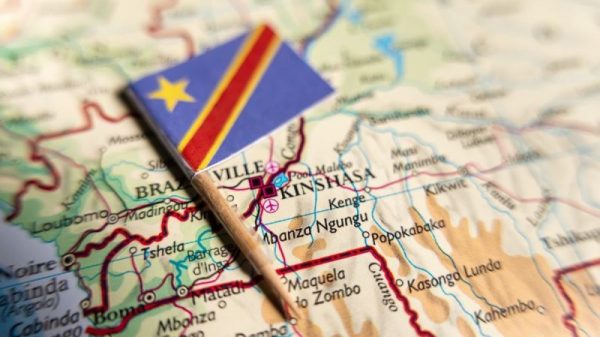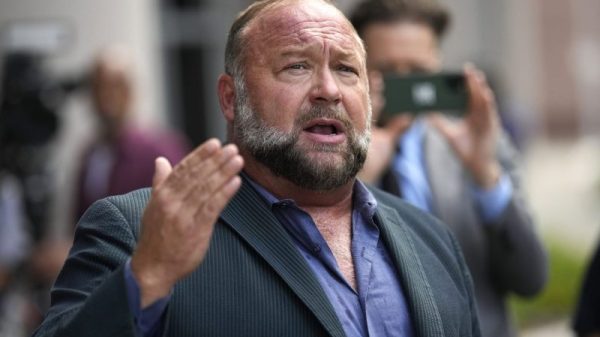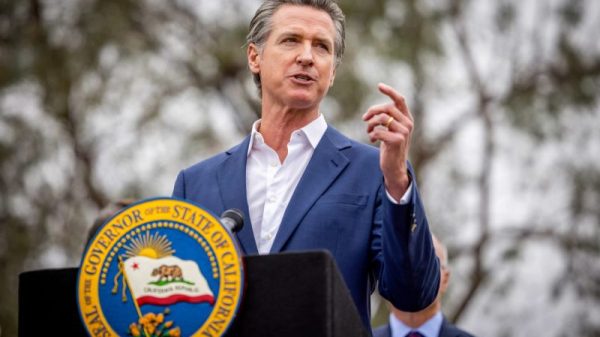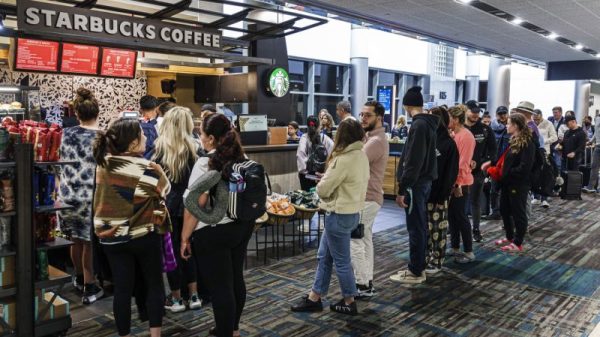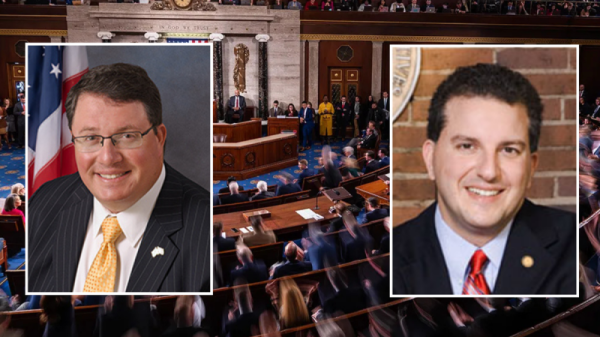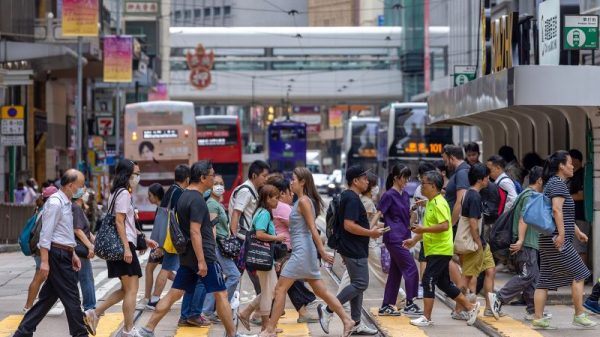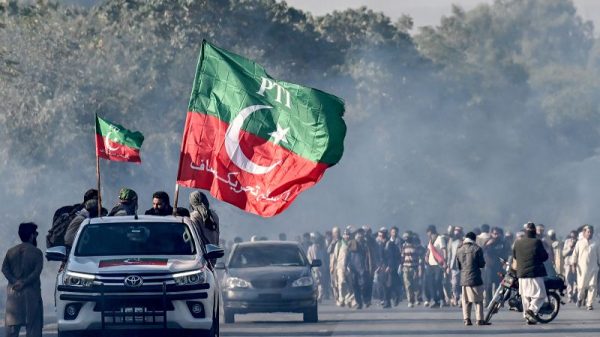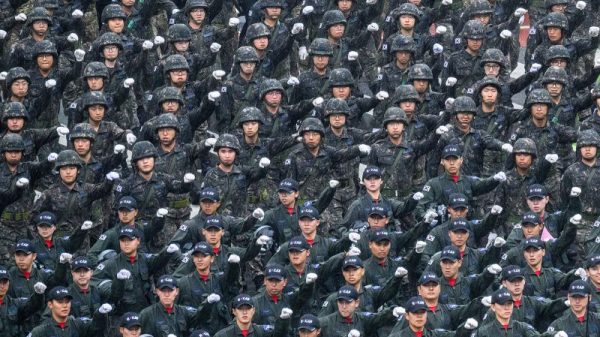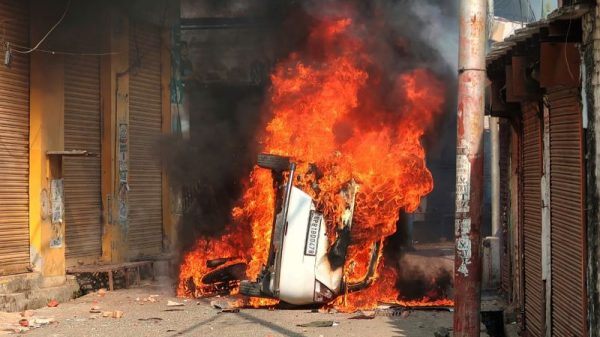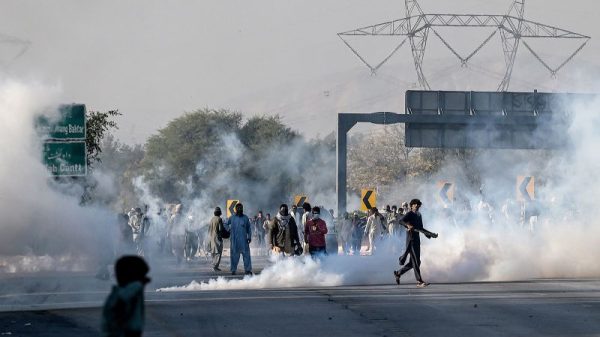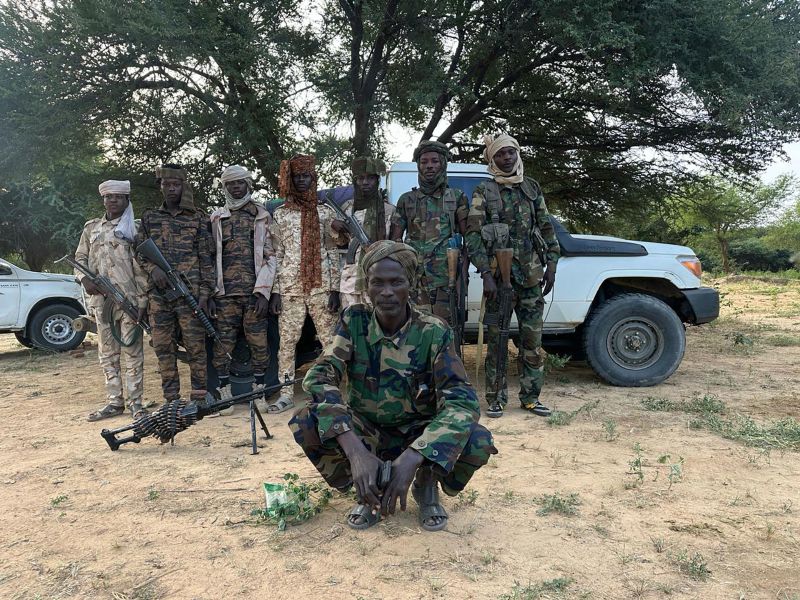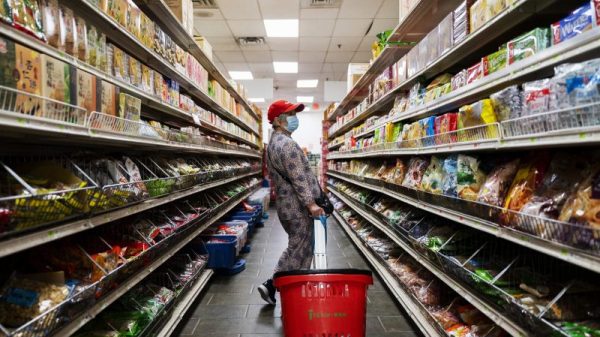“La tasweer! La tasweer!” (“Don’t film! Don’t film!”) the general shouted, his eyes flashing with anger, his jaw clenched as he stormed towards us. A couple of fighters hopped off the back of the militia’s lead truck, fanning out around our vehicle, their rifles drawn.
The second truck that had been following us, tan-colored and laden with a heavy machine gun abruptly pulled over to our side, hemming us in.
There was a moment of panic — were they going to shoot us?
We had come to Darfur to report on the world’s worst humanitarian crisis, never intending to become part of the story.
But months of planning came apart in moments when we were detained by a militia led by the man everyone called the general.
Cameraman Scott McWhinnie handed him the camera, assuring him, “We’re not filming, we’re not filming.” Producer Brent Swails quickly got out of our truck to try to defuse the situation.
“Are we OK? Are we OK?” he asked.
Abruptly, the general turned his back on us and grabbed a rifle from one of his soldiers, before taking aim across the tree-dotted savanna. I was relieved that the gun wasn’t pointed at us but still disturbed by his erratic behavior.
I looked pleadingly at our driver. “What’s going on?” His face was ashen. “I don’t know,” he said.
The general fired off a round. The target appeared to be a bird. He missed.
We had arrived in North Darfur the previous day. The goal was to get to Tawila, a town under the control of SLM-AW, a faction of the Sudan Liberation Movement, led by Abdul Wahid al-Nur, a neutral party in Sudan’s bitter civil war. Tawila is just 32 miles (51 kilometers) southwest of the besieged city of El Fasher which is the frontline of the grisly fight for the Darfur region. As a result, it has become a refuge of sorts for the tens of thousands fleeing the city.
The 18-month conflict in Sudan has been drastically overshadowed by the wars in Ukraine and Gaza but the UN fears it could become far deadlier: a cruel confluence of hunger, displacement, and disease with both the Sudanese Armed Forces (SAF) and the Rapid Support Forces (RSF), the two main warring parties in this conflict, accused of war crimes.
According to the UN, more than 10 million people have been displaced in the violence, almost a quarter of Sudan’s population. More than 26 million people — over three times the population of New York City — face acute hunger.
In particular, all eyes are on Darfur, where a genocide was perpetrated from 2003 to 2005 and where vicious war crimes have heightened fears that the worst could be realized again.
In August, a famine was declared in the Zamzam displaced people’s camp in Darfur. And yet, only a handful of international journalists have been able to get in since the start of the war to report on what is happening.
After many months of failing to get permission to visit Darfur from the SAF or the RSF, the invitation from the SLM-AW leadership to visit Tawila seemed the safest way to get in and tell the story.
But when we reached the agreed meeting spot in the town of Abu Gamra, our hosts were nowhere to be found. Instead, a rival militia stood in their place. They had two Toyota Land Cruiser pickup trucks, weighed down with rocket propelled grenades and heavy machine guns.
Our driver was led off in chains to the town jail.
For three hours we were interrogated, one by one, in a small, windowless room. About eight men asked the questions. “Why are you here?” “Who sent you here?” “Who gave you permission to be here?”
We answered their questions but got no information in return: who these men were or what they wanted with us.
When the driver returned later without the chains, there was a brief moment of optimism. Perhaps, we would be escorted to the border and simply instructed not to return.
But the militants bundled us into our vehicle and ordered us to follow them.
Our convoy quickly veered off onto a dirt track, heading deeper into Darfur.
It was at this point that the general suddenly stopped his vehicle and started shouting at us, before shooting his gun. The goal, presumably, to scare us. It worked.
We stopped again, maybe an hour later, by a dry riverbed lined with trees. The youngest fighters laid out a mat and brought out a flask of camel milk for the general and another older man known as the security chief, who wore a turban and sunglasses to hide a missing eye. Trembling, I took off my shoes and sat down in front of them.
“Please, we are very frightened,” I told them in halting Arabic. “I am a mother. I have three little boys.”
The general looked disinterested, but I could see the security chief’s face soften.
“Don’t be frightened, don’t be frightened,” he assured me, “We are human beings.”
The security chief asked us for our partners’ phone numbers, so that he could call them and assure them that we were OK. Grudgingly, I handed him my husband’s number — reluctant to put my family through any stress but conscious that it might also be a way for our captors to check my story. Later, we would find out that an English speaker had called my husband and Scott’s wife from the city of Port Sudan, thousands of miles away from where we were held, to say that we were safe and in good health but threatening that we would be imprisoned for many years if they spoke about it to anyone.
For the next 48 hours, we were held under armed guard by the general, the security chief and roughly a dozen soldiers, some who looked no older than 14. Our detention was spent out in the open, underneath acacia trees. As the only woman, and with no private space to relieve myself, I limited my water and food intake. Sleep, when it came, was a mercy, a reprieve from the clawing sense of panic at not knowing when I would be able to see my children again.
As a journalist, one never wants to become the story. And yet our experience is instructive in understanding the complexities of the conflict in Darfur and the challenges of getting food and aid to those who need it most and getting the story out to the world.
During our journey in and out of North Darfur, we spent many hours traversing the remote region on sandy tracks. We had to dig ourselves out more than 10 times and had a flat tire at least once a day. There are no paved roads in the area, which makes the distribution of aid even more challenging.
But where sturdy trucks with the appropriate tires may help expedite that process, the issue of gaining access to the territory is a much harder problem to solve. The state of North Darfur is the center of some of the heaviest fighting between the RSF and SAF. Swaths of it are under the control of a patchwork of different militias with competing agendas who regularly shift allegiances. You can have a guarantee of safe passage from one, only to be blocked by another 10 miles down the road.
In August, at US-led talks on Sudan in Geneva, the Sudanese Armed Forces agreed to allow the flow of aid through Adre, the largest border point between Chad and Darfur. But fewer than 200 trucks have entered in the last two months — a fraction of what is needed on the ground — and only a handful of those have reached the famine-hit Zamzam camp outside El Fasher, where close to half a million people are struggling to survive.
Earlier this month, Doctors Without Borders (MSF) announced it was having to suspend its operations in Zamzam.
“This is a disaster for us. Knowing that we have the team on the ground capable to work and that this suspension is due to either administrative impediments or blockages by the warring parties is, of course, frustrating. We keep trying to push … We cannot abandon these people,” Michel Lacharité, MSF’s Head of Emergency Operations told me.
Compounding the chaos is the difficulty of communications. During our time in North Darfur, we passed at least six cell phone towers but none of them were operational. The pecking order of any group is clearly marked by who is carrying the satellite phone. Our captors confiscated our satellite phone but allowed us to keep our cell phones — confident that they would never work. And they did not. Some of the groups have Starlink satellites that they use to stay in touch. But for most ordinary people, there are few ways to have contact with the outside world.
The net result of these manifold challenges is that NGOs, human rights organizations and journalists have almost no access to North Darfur.
“The world doesn’t see us, the help doesn’t come,” the security chief mused to me one afternoon.
Instead, the most valuable and reliable data we have about the situation on the ground in Darfur comes from satellites.
According to the Yale Humanitarian Research Lab, which uses satellite imagery to build up a picture of the situation on the ground, in the first two weeks of October at least 14 villages in Darfur were set ablaze by the RSF, heightening concerns that after a relative lull during the rainy season, the conflict is once again ratcheting up.
But satellite images can only tell part of the story. They don’t allow us to connect, to empathize, to engage.
On our last day in detention, the general and security chief disappeared for about six hours, leaving us in the custody of their young fighters. At one point, several of them told us to remove our bags from our vehicle, saying they were taking our driver to the local market. The four of us looked at each other uneasily. Were they planning to abandon us? Or hand us over to another group? We had no choice but to do what we were told and unload our gear.
Later, when the general and the security chief returned, they were in good spirits.
“It has been decided you will be released tomorrow,” they told us. “We thought you were spies but now you can go home.”
A wave of relief crashed through my body. There were smiles and handshakes with our captors. We posed awkwardly for a photograph at the edge of the mat that had been our makeshift prison.
Our ordeal was over. We were unharmed and soon to return home. The fear and worry quickly replaced by a feeling of bitter disappointment, of failure. We never made it to Tawila. Never managed to talk to the people in Darfur whose lives have been chewed up by this vicious civil war. Untold stories that the world may never hear.
CNN Impact Your World
If you’d like to help Sudan refugees through charities providing assistance, go to the form below or click here. See more ways to help communities on Impact Your World.


